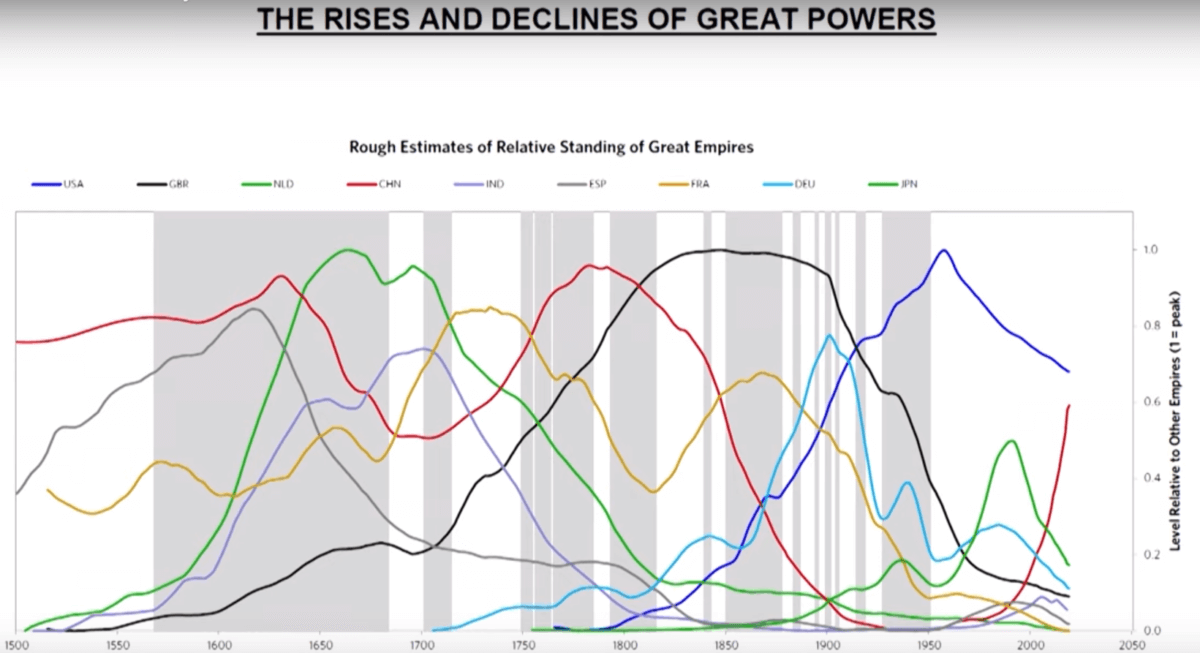Billionaire Ray Dalio: US Empire Fading as Shanghai Becomes World Financial Hub

Ray Dalio believes that the U.S. empire is losing steam. China is on the rise, and if the trade war goes awry, it will lead to chaos. | Credit: Reuters/Jason Lee
- Ray Dalio believes the world’s economy will face a turbulent decade.
- The old U.S. economic order is on the way out.
- If China and the U.S. don’t negotiate in good faith, capital wars will intensify.
Ray Dalio, a billionaire hedge fund manager, laid out a stark vision of the U.S.-China trade war. In a recent speech at the National Committee on U.S.-China relations, Dalio warned listeners that the current trade standoff could turn into a “capital war” if the two sides can’t find a way to negotiate.
Dalio has been sounding the alarm recently. In October, he said the world faces a “scary situation” as the economy is likely to falter while facing a massive wealth inequality gap. And at a recent event , Dalio thundered that the U.S. dollar’s role as the world’s reserve currency is ending:
In my opinion, we’re near the end, in the late stages, of our reserve currency system – it’s a fiat monetary system. Not only do we have negative rates, but we’re going to have much bigger deficits … and that’s not half the story. Because the larger story is the unfunded liabilities.
This talk of a new world economic order led Ryan Smith to speculate that Dalio may be a secret bitcoin supporter.
Now Dalio is adding to this bleak outlook. In his latest speech, he suggests that China is set to overtake the U.S. as the world’s leading power. And if this transition isn’t handled carefully, it could lead to economic chaos.
U.S. Empire Peaked in the 1950s, Will Soon Be Overtaken
In Ray Dalio’s presentation, he offered the following slide showing his estimation of the relative power of various empires over the centuries:

According to Dalio’s data, the U.S. (dark blue line) became the world’s leading superpower in the early 1900s, overtaking Great Britain. America’s power peaked just after World War II. Since then, however, America’s power has declined from its maximum to less than 70% of its former height. Meanwhile, China (red line) has soared from the bottom of the table to nearly matching the United States. Extend the lines to the right, and China would pass the U.S. within a few years. To that point, describing the rise and fall of empires, Dalio said:
There’s the development of the financial system, the financial hub. In the Dutch empire, it was Amsterdam. Then it was London. Then it was New York. Increasingly, it will be Shanghai.
Dalio Issues a Clear Warning
Ray Dalio didn’t mince any words in describing the trade war between the U.S. and China in his speech. Dalio reminded listeners that China has historically been one of the world’s most powerful empires using their “Confucian” approach that doesn’t rely on an American understanding of the world or the belief in democratic principles. Dalio warned politicians that would seek to change China:
We can’t ever expect that we’re going to make the Chinese like Americans, and to adopt our system, any more than they should expect that Americans should be made like Chinese.
Dalio’s 35 years of doing business in China leads him to conclude that the two countries simply aren’t going to take up the other’s beliefs.
And if negotiations don’t go well, capital “wars” could intensify. Dalio hopes that the two sides will find a “win-win” approach with mutual understanding but fears that a “lose-lose” relationship will develop if President Trump and President Xi of China keep up their belligerent rhetoric.